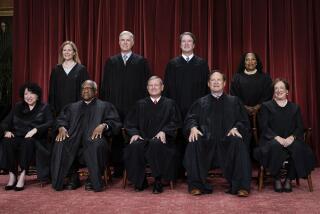Thomas Backs Precedents as Testimony Ends
- Share via
WASHINGTON — Assuring Senate Democrats that he believes in upholding legal precedents, even those he personally disagrees with, Supreme Court nominee Clarence Thomas completed his testimony before the Senate Judiciary Committee on Monday.
Liberals and women’s rights advocates have feared that conservatives who now control the high court will move aggressively to reverse some rulings, including decisions upholding legalized abortion, affirmative action and the separation of church and state.
Although Thomas steadfastly refused throughout the hearings to give his opinion of the Roe vs. Wade abortion ruling of 1973, he insisted Monday that the justices must think twice before overturning a well-established precedent.
“I think that the burden is on those who would change a precedent to show more than simply that they disagree with the underlying opinion,” Thomas told Sen. Patrick J. Leahy (D-Vt.). “You cannot, simply because you have the votes, begin to change the rules, to change a precedent. That’s not a basis for doing it.”
Thomas’ five days on the witness stand matched the longest interrogation of any Supreme Court nominee. But the 43-year-old black conservative is likely to fare far better than the other nominee who endured such a prolonged period in the spotlight: Judge Robert H. Bork, who was defeated in 1987.
Although several members say they are undecided, Republicans and Democrats predicted that Thomas will be endorsed, receiving eight or nine votes on the 14-member panel.
For the rest of this week, the committee will hear from representatives of interest groups that are for and against Thomas. Under its rules, the committee will postpone a vote and make its decision during the week of Sept. 30.
On Monday, Thomas told the committee that he puts a high value on “continuity and stability” in the law.
In addition, he disputed Chief Justice William H. Rehnquist’s view that precedents may be overturned whenever five members of the court strongly disagree with the existing doctrine.
“Over time, an important precedent could be a basis upon which . . . institutions develop and grow, expectations develop and grow,” Thomas said. “Continuity (of the law) is the basis for the stability of our system. I do not think that it is appropriate to just simply say, as a judge, ‘This is the way I feel, and that overrides everything else.’ ”
He added that he would be especially reluctant to overturn court precedents that have been on the books for a while and which have been accepted as law.
If Thomas maintains that position, he will part with fellow conservatives, in particular Rehnquist and Justice Antonin Scalia, who have demonstrated greater willingness to cast aside past liberal rulings.
Thomas’ comments, though not a sure gauge of his votes on the high court, nonetheless address an issue that looms large before the Rehnquist Court.
Will a solidly conservative majority simply reverse rulings from a more liberal era, including the Roe vs. Wade ruling of 1973 on abortion?
On the final day of its most recent term, the chief justice seemed to say yes.
“Stare decisis (a policy of observing precedent if the facts of the cases are similar) is not an inexorable command,” Rehnquist wrote in the case of Payne vs. Tennessee, a ruling overturning two recent precedents that forbid the family of a murder victim to give testimony in favor of executing the convicted killer. If a majority of the court believes a past ruling is “unworkable or badly reasoned,” it will be overturned, he said.
Moreover, Rehnquist said that precedent is most important “in cases involving property and contracts rights,” least important when criminal defendants are relying on “procedural and evidentiary rules.”
Just hours after this decision was released on June 27, Justice Thurgood Marshall announced his resignation. In what then stood as his last dissent, the 83-year-old liberal denounced “this radical new exception to the doctrine of stare decisis. “
“Power, not reason, is the new currency of this court’s decision-making,” Marshall said. “The majority sends a clear signal that scores of established constitutional liberties are now ripe for reconsideration,” he warned.
When asked about precedent Monday, Thomas immediately mentioned “Justice Marshall’s dissent in Payne vs. Tennessee. I think it is a very stern and necessary admonition to everyone, all of us who are judges.”
Later, when asked about Rehnquist’s suggestion that precedents involving “property and contract rights” are more deserving of being upheld, Thomas commented, “That makes no sense to me.”
But Thomas said he did not agree with Marshall that the death penalty itself is automatically unconstitutional. “Philosophically, there is nothing that would bother me personally from upholding (the death penalty) in appropriate cases,” the nominee told the senators.
The retiring Marshall was the last of the justices who insisted--in defiance of settled precedent--that capital punishment itself violated the Constitution.
When the senators finished their final round of questions, Thomas thanked them for their “courtesy and fairness” and said he had been “honored” to appear.
On the way out of the room, he looked exhausted but relieved. “I’m glad it’s over,” he said, exhaling deeply.
Immediately after Thomas’ testimony, leaders of the American Bar Assn. told the committee that Thomas was qualified to sit on the high court, but he was not “among the most prominent members of the legal profession.”
Since 1970, every Supreme Court nominee, including Judge Bork, has been rated “well-qualified” by a majority of the ABA’s investigating committee. But, after interviewing more than 1,000 persons in July and August, the 15-member ABA panel gave Thomas a lukewarm “qualified” rating.
“He is untested,” Los Angeles lawyer Ronald L. Olson, the panel chairman, told the senators. “He’s had very little practice dealing with the fundamental constitutional principles that govern wide areas of conduct.”
More to Read
Get the L.A. Times Politics newsletter
Deeply reported insights into legislation, politics and policy from Sacramento, Washington and beyond. In your inbox twice per week.
You may occasionally receive promotional content from the Los Angeles Times.










